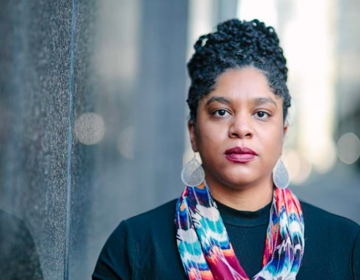Scholarship fund aims to make Philly midwife ranks more diverse
The vast majority — more than 90 percent — of American College of Nurse-Midwives members are white. Some recent grads of Penn’s nurse-midwifery program want to change that.

Members of the University of Pennsylvania's nurse-midwifery program's Class of 2017 are working to establish a scholarship fund for students of color. (Courtesy of Nicole Chaney)
The vast majority — about 95 percent — of certified nurse-midwives in the U.S. are white.
Confronting that statistic —and the fact that her class of 21 had just two student midwives of color — Nicole Chaney, a December graduate of the University of Pennsylvania’s nurse-midwifery program, had an idea. Instead of the traditional gift to the faculty, she suggested her class create a full-tuition scholarship fund for midwives of color at Penn.
“We talked about racism in health care and in our own profession,” said Chaney. “We thought of what barriers there are for people to go to school, and this seemed like a good start — to not only give someone money, but to raise awareness.”
Kateryn Nuñez, who now works in a private home-birth practice in Brooklyn, said when Chaney presented the idea to the class, it was a no-brainer.
So far, they’ve raised more than $11,000 as they work toward a goal of $125,000. Once they hit the mark, Penn will donate $25,000 to establish an endowed scholarship, which will be awarded year after year. Each month, the graduates are giving a portion of their salaries to the cause in hopes of reaching their goal within the next few years.
At a moment when the maternal mortality rate is three to four times higher for black women, Nuñez said getting more midwives of color into the field is essential — and overdue.
“Black moms are dying every day at an exponential rate,” said Nuñez. “Even when you remove the facts that, in black communities, there are more chronic health conditions because of systems of stress and poverty and food deserts … black women still have much poorer outcomes.”
In response to calls across the country to reduce the nation’s maternal mortality rate, the Pennsylvania House of Representatives unanimously approved a bill in December to create a Maternal Mortality Review Committee to study the stunning rates of pregnancy-related deaths.
A troubling report from Philadelphia’s Department of Public Health in 2015 found that the rate of maternal mortality in the city far surpasses the national average. Philadelphia’s pregnancy-related mortality rate was 27.4 per 100,000 births, while the national average was 17.8. The study also found that black women had disproportionately higher rates of pregnancy-related deaths in comparison to white women.
After collecting more than 200 stories of black mothers in the past year, ProPublica and NPR found “the feeling of being devalued and disrespected by medical providers” was a consistent theme.
Some women fear providers’ racial biases
While Nuñez was in school and working at clinical sites, she said there were times she heard midwives and clinicians blaming poor black women for their circumstances.
“I would hear them blaming [the women] for having STDs or for having diabetes or for being obese, and it was so uncomfortable for me because I am a black Latina, and I am a part of this category of people that they’re talking about,” she said. “I’ve seen bad care, and I think black midwives are especially equipped to not do that and understand that things are more complicated.”
Nuñez wanted to be a midwife because of the philosophy behind the care — listening to women, understanding where they’re coming from, and respecting their concerns. And it’s a problem, she said, when patients feel like they can’t share their full story because they’re afraid of providers’ racial biases.
“There’s this fear of going to face their providers and saying, ‘I don’t know if my child is being nourished well,’ because there’s a fear, ‘Oh, will these people take my children away from me?’ ” she said.
Midwives are often associated with nontraditional birth centers, but most work in hospital settings and increasingly serve women of color. Nuñez said creating the scholarship fund could make a big difference for these patients.
“There’s just more trust when someone looks like them and comes from the same background … when patients don’t have to have those fears, then they can actually share everything that’s going on,” she said. “Then you can actually work on addressing their needs, and so this will never be complete until there are more midwives of color and clinicians of color.”
Emma Dorsey, another recent graduate, said patients she worked with were also made to feel like outliers in their search for quality health care. Before she became a midwife, she worked for three years as a visiting nurse with low-income, first-time moms throughout Philadelphia.
“It was very clear to me that a lot of my clients were being excluded from their own care. Their feedback was deemed frivolous, they were not included in decision-making, they didn’t know what kind of tests they were receiving or why, they didn’t know why their waits were so long.
“And they were made to feel like cogs in a machine,” she said. “Respect and autonomy may sound like extras and not the foundation of high-quality care, but I think we’re seeing more and more with these maternal mortality studies that when people aren’t listened to, they can die … Respect isn’t a cushy luxury, respect is the way we save lives.”
The case of Serena Williams
Ishimabet Bryce, a recent graduate who currently works in a Brooklyn hospital, said she still cannot stop thinking about tennis star Serena Williams. In a January interview with Vogue, Williams talked about suffering a pulmonary embolism — a blood clot that travels through the bloodstream and into the lungs — after she gave birth in September. Given her history of blood clots, Williams alerted the hospital staff, but she said they brushed off her concerns until she insisted on a CT scan.
“Just the fact that you can have a woman like her — her money, her status — and nothing she has been able to claim in her lifetime has protected her from this discrimination,” Bryce said. “She has the medical history to know what to recognize, and she’s not being taken seriously.
“I don’t understand how it got to that point, but if you think about the racism, and then you attach it to the maternal mortality and her being a woman of color, I think you can see how you get to a point where if she was anyone else, she might not be here.”
Bryce has wanted to be a midwife since she was a child. Her grandmother is a nurse, and her great-aunt was delivered by a midwife in Jamaica.
“I’ve found my calling to be in midwifery and giving the power back to these women and caring for them and advocating for them,” she said.
For Bryce and the others in her graduating class, the scholarship is just a start. She hopes to see the energy behind the scholarship fund ripple into more positive changes, such as hiring instructors of color and having more organized discussions on how to work with patient populations of color.
“I’m very proud of the faculty for their support, but I’m not going to say that’s where it should end because they’ve got to do better,” she said.
In May, the recent alumnae will be honored at the School of Nursing graduation for contributing to the advancement of the community. As of now, they’re in touch with students at the University of California, San Francisco, who reached out about starting their own scholarship fund for midwives of color.
This is a corrected story. An earlier version listed Kateryn Nuñez as working in a different New York City borough.
WHYY is your source for fact-based, in-depth journalism and information. As a nonprofit organization, we rely on financial support from readers like you. Please give today.





